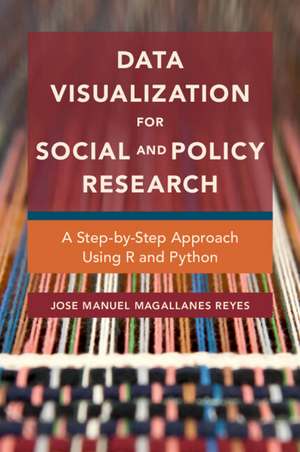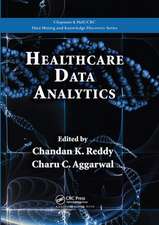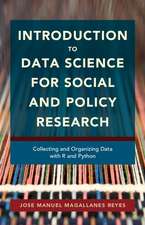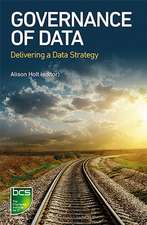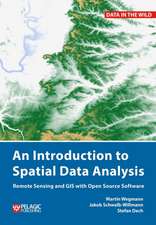Data Visualization for Social and Policy Research: A Step-by-Step Approach Using R and Python
Autor Jose Manuel Magallanes Reyesen Limba Engleză Paperback – 6 apr 2022
| Toate formatele și edițiile | Preț | Express |
|---|---|---|
| Paperback (1) | 244.29 lei 6-8 săpt. | |
| Cambridge University Press – 6 apr 2022 | 244.29 lei 6-8 săpt. | |
| Hardback (1) | 615.21 lei 3-5 săpt. | |
| Cambridge University Press – 6 apr 2022 | 615.21 lei 3-5 săpt. |
Preț: 244.29 lei
Preț vechi: 305.37 lei
-20% Nou
Puncte Express: 366
Preț estimativ în valută:
46.75€ • 48.63$ • 38.60£
46.75€ • 48.63$ • 38.60£
Carte tipărită la comandă
Livrare economică 15-29 aprilie
Preluare comenzi: 021 569.72.76
Specificații
ISBN-13: 9781108714389
ISBN-10: 1108714382
Pagini: 280
Dimensiuni: 151 x 229 x 16 mm
Greutate: 0.4 kg
Ediția:Nouă
Editura: Cambridge University Press
Colecția Cambridge University Press
Locul publicării:New York, United States
ISBN-10: 1108714382
Pagini: 280
Dimensiuni: 151 x 229 x 16 mm
Greutate: 0.4 kg
Ediția:Nouă
Editura: Cambridge University Press
Colecția Cambridge University Press
Locul publicării:New York, United States
Cuprins
1. Introduction; Part I. Get Started: 2. Data for plotting; 3. Visualization basics; Part II. Visualizing Tabular Data: 4. Insights from ONE variable; 5. Insights from TWO variables; 6, Insights from THREE or more variables; Part III. Beyond Tabular Data: 7. Geospatial data; 8. Data from the social network.
Recenzii
'Sometimes social science students understand the value of data visualization, but they are wary of the costs of mastering high-tech approaches. Professor Magallanes is the answer to this problem. This text skillfully articulates a step-by-step guide for using two of the most powerful tools in a data scientist's toolbox: R and Python. Professor Magallanes has a talent for simplifying the complicated, and honing in on the most important components of telling stories with data. This book is an essential resource for anyone whose regular habits of making graphs involve searching for someone else's code chunks on the Internet. With this book, we can all stop Googling and start graphing.' Jennifer Nicoll Victor, Professor of Political Science, George Mason University
'José Manuel Magallanes Reyes is back at it again with his unique approach of simultaneously introducing users to computational social science programming in both R and Python. The approach allows readers not just to 'learn a language', but rather to learn the key conceptual ideas behind programming and computational social science. With his first volume having tackled data collection and statistical analysis, it was an absolute pleasure to see him turn his approach to the all-important subject of data visualization in this text. Having recommended his previous book to countless numbers of students, I am absolutely thrilled to now have a second volume to share as well!' Joshua A. Tucker, Professor of Politics and Co-Director, Center for Social Media and Politics, New York University
'Professor Magallanes cuts directly to the heart of the matter, quickly and clearly imparting the concepts and skills that a modern social science researcher needs to communicate complex data relationships. He leads the reader through a wide variety of visualization approaches using a conversational style and systematic approach.' Dr. Timothy Gulden, Senior Policy Researcher, RAND Corporation
'A wise professor once told me, 'If there is something you want your audience to remember, put it in a figure.' This timely volume will show you how, with copious examples drawn from extensive experience in social and policy research.' Abraham D. Flaxman, Professor of Global Health at the Institute for Health Metrics and Evaluation, University of Washington
'Information literacy demands that we convey data in digestible, visually appealing plots and graphs. However, even advanced quantitative researchers often lack the tools to produce effective visualizations of the data they work with. This is where Magallanes' book comes in. With his characteristic narrative – a meticulous but nimble prose, chock full of illustrative examples – Magallanes guides inexperienced and sophisticated readers alike through easy-to-grasp data visualizations. His presentation of geospatial and network data visualizations alone makes this an invaluable go-to reference for those working in R and Python.' Guillermo Rosas, Professor of Political Science, Washington University in St. Louis
'Surviving the current deluge of social science data is only possible with novel computational analysis and machine learning techniques. Among the many approaches currently in vogue, none is more important than human visualization of data, whether in raw form, suitably plotted, or else transformed in some way meaningful to the problem at hand. Professor Magallanes' new book offers a wide range of general approaches and explicit code for developing modern data visualizations. It will be an important addition to the library of every social scientist and policy researcher contending with the flood of new data.' Robert Axtell, Professor of Computational Social Science, Department of Computational and Data Sciences, and Department of Economics, George Mason University
'José Manuel Magallanes Reyes' Data Visualization for Social and Policy Research is an outstanding and greatly needed resource in a rapidly expanding area of academic and applied data analysis and empirical methodology. The guided instruction is accessible to novice users and soon has us producing powerful visualizations from simple univariate, bivariate, multivariate, geospatial, and social-media text data.' Robert J. Franzese Jr., Professor and Associate Chair, Department of Political Science, The University of Michigan, Ann Arbor; Fellow and former President, The Society for Political Methodology
''A picture is worth a thousand words.' Nowhere is this more the case than when presenting data to policymakers in order to guide decision-making. In this book, José Manuel Magallanes Reyes shows us how, drawing upon his extensive background in social science, public policy, data science, analytics, and teaching visualization to undergraduate and graduate students in political science and public policy.' Ed Lazowska, Professor, and Bill & Melinda Gates Chair Emeritus, Paul G. Allen School of Computer Science & Engineering, Founding Director of the eScience Institute, University of Washington
'José Manuel Magallanes Reyes is back at it again with his unique approach of simultaneously introducing users to computational social science programming in both R and Python. The approach allows readers not just to 'learn a language', but rather to learn the key conceptual ideas behind programming and computational social science. With his first volume having tackled data collection and statistical analysis, it was an absolute pleasure to see him turn his approach to the all-important subject of data visualization in this text. Having recommended his previous book to countless numbers of students, I am absolutely thrilled to now have a second volume to share as well!' Joshua A. Tucker, Professor of Politics and Co-Director, Center for Social Media and Politics, New York University
'Professor Magallanes cuts directly to the heart of the matter, quickly and clearly imparting the concepts and skills that a modern social science researcher needs to communicate complex data relationships. He leads the reader through a wide variety of visualization approaches using a conversational style and systematic approach.' Dr. Timothy Gulden, Senior Policy Researcher, RAND Corporation
'A wise professor once told me, 'If there is something you want your audience to remember, put it in a figure.' This timely volume will show you how, with copious examples drawn from extensive experience in social and policy research.' Abraham D. Flaxman, Professor of Global Health at the Institute for Health Metrics and Evaluation, University of Washington
'Information literacy demands that we convey data in digestible, visually appealing plots and graphs. However, even advanced quantitative researchers often lack the tools to produce effective visualizations of the data they work with. This is where Magallanes' book comes in. With his characteristic narrative – a meticulous but nimble prose, chock full of illustrative examples – Magallanes guides inexperienced and sophisticated readers alike through easy-to-grasp data visualizations. His presentation of geospatial and network data visualizations alone makes this an invaluable go-to reference for those working in R and Python.' Guillermo Rosas, Professor of Political Science, Washington University in St. Louis
'Surviving the current deluge of social science data is only possible with novel computational analysis and machine learning techniques. Among the many approaches currently in vogue, none is more important than human visualization of data, whether in raw form, suitably plotted, or else transformed in some way meaningful to the problem at hand. Professor Magallanes' new book offers a wide range of general approaches and explicit code for developing modern data visualizations. It will be an important addition to the library of every social scientist and policy researcher contending with the flood of new data.' Robert Axtell, Professor of Computational Social Science, Department of Computational and Data Sciences, and Department of Economics, George Mason University
'José Manuel Magallanes Reyes' Data Visualization for Social and Policy Research is an outstanding and greatly needed resource in a rapidly expanding area of academic and applied data analysis and empirical methodology. The guided instruction is accessible to novice users and soon has us producing powerful visualizations from simple univariate, bivariate, multivariate, geospatial, and social-media text data.' Robert J. Franzese Jr., Professor and Associate Chair, Department of Political Science, The University of Michigan, Ann Arbor; Fellow and former President, The Society for Political Methodology
''A picture is worth a thousand words.' Nowhere is this more the case than when presenting data to policymakers in order to guide decision-making. In this book, José Manuel Magallanes Reyes shows us how, drawing upon his extensive background in social science, public policy, data science, analytics, and teaching visualization to undergraduate and graduate students in political science and public policy.' Ed Lazowska, Professor, and Bill & Melinda Gates Chair Emeritus, Paul G. Allen School of Computer Science & Engineering, Founding Director of the eScience Institute, University of Washington
Notă biografică
Descriere
Teaches creative, effective visualization techniques for tables, time series, maps, text, and networks for beginners in R and Python.
